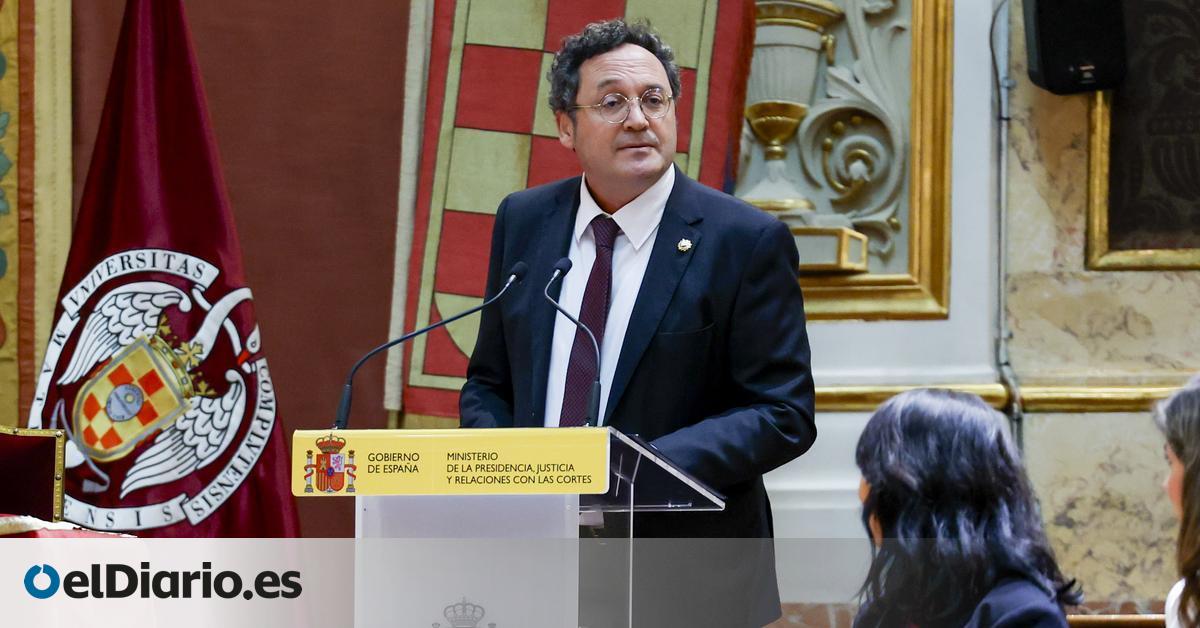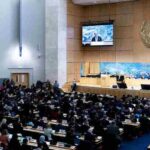
The State Attorney General, Álvaro García Ortiz, faces the most critical days of his mandate in the Supreme Court this week. The contentious-administrative judges will decide on Tuesday whether, as requested by an association, annul his appointment as head of the Prosecutor’s Office. A day later, he will become the first attorney general in history to appear as an investigator in a criminal case when he testifies before Judge Ángel Hurtado for the alleged leak of the confession of Isabel Díaz Ayuso’s partner. García Ortiz faces, in the first case, a courtroom with an overwhelming conservative majority and, in the second, the conviction of the investigating judge that he had a “preeminent” role in the leak.
García Ortiz’s first key date is with a room full of well-known names. One of the contentious-administrative sections of the Supreme Court will study the appeal from the Professional and Independent Association of Prosecutors (APIF) that asks to annul his appointment. The same association that accuses him in the criminal case for the leak of Alberto González Amador’s confession and a good part of the court that, already in November 2023, accused him of “diversion of power” by being promoted irregularly to his predecessor Dolores Delgado.
This Tuesday’s debate connects directly with that ruling that annulled Delgado’s appointment as courtroom prosecutor. Firstly, because it is the association’s main argument for asking that García Ortiz be stripped of his position as attorney general: they believe that this sentence makes it “impossible” for him to be considered suitable for that position. Secondly, because four magistrates from the third chamber that will make the decision already participated in the ruling that annulled Delgado’s promotion. What at that time was considered his most difficult week.
García Ortiz tried, unsuccessfully, to remove the four from the deliberations when he understood that his 2023 ruling, overturning Delgado’s appointment, accusing him of “diversion of power”, questioned his impartiality to now decide on his own appointment as attorney general, but The Supreme Court responded that it had been requested largely out of time.
This Tuesday they will face each other again with a practically identical section of the contentious and conservative majority. The rapporteur of that sentence, Luis Díez-Picazo, is part of the court. The new speaker is José Luis Requero, who also participated in that ruling and who in an article from those dates described the Prosecutor’s Office and the Constitutional Court as “disastrous.” They will be accompanied by Pablo Lucas, the conservative candidate to preside over the Judiciary after its last renewal, and Antonio Fonseca-Herrero. The court is completed by Pilar Teso, twice a progressive candidate to preside over the governing body of judges.
In the Prosecutor’s Office, they highlight that the third chamber accumulates sentences that, in recent years, have annulled discretionary appointments both in the Public Ministry and in the Supreme Court itself: from the two appointments of Dolores Delgado after leaving the head of the Prosecutor’s Office to the appointment of Eduardo Esteban as juvenile court prosecutor – both in the hands of the Constitutional Court – going through several appointments in different court rooms. They also highlight that Teso signed a harsh dissenting vote criticizing that his colleagues in the room conditioned the ability of the Prosecutor’s Office to appoint senior officials.
The appeal with which APIF questions the appointment of García Ortiz as attorney general in a different way from the rest of previous cases. He understands, first of all, that the annulment of Dolores Delgado’s promotion accusing him of “diversion of power” makes it impossible to consider him “suitable” for the position. He also alleges that, at the time, he did not agree to the Senate’s request that the Fiscal Council make a report on the amnesty law as the General Council of the Judiciary did, promoted by the conservative sector. Among other allegations, it is also on the table that the conservative sector of that same Council declared that he was not suitable to revalidate the position. What García Ortiz described as a “court of honor.”
It is not clear if the court’s decision will be voted on that same Tuesday and will be known on the same day. The closed-door deliberations on whether or not he can continue in his position will begin 24 hours before his second key appointment with the Supreme Court: his declaration as being investigated in the case for the leak of Alberto González Amador’s confession. The starting signal for the statements of the three defendants after more than two months of frenetic investigation by Judge Hurtado.
The first attorney general investigated
Álvaro García Ortiz will have to go in person, this time, to the Supreme Court at ten in the morning on Wednesday, January 29. The jurist will become the first attorney general to appear as an investigator in a criminal case and he will do so with a good part of the case already investigated and with the judge convinced, at least according to what is reflected in his records, that both he how two of his collaborators devised a strategy to leak confidential information from the tax fraud case of the partner of the president of the Community of Madrid.
The investigation, which began in the Supreme Court at the end of October with the search of his office on Fortuny Street to seize all the messages and emails related to the case, has not yet found conclusive proof that he leaked that email. with which González Amador’s lawyer accepted a nominal prison sentence and a fine in exchange for not actually going to prison. The Civil Guard attributes a “preeminent” role to him in the leak after examining the messages that illustrate how on the night of March 13, García Ortiz demanded to know the details of the emails exchanged by the Prosecutor’s Office with the businessman’s lawyer to deny various information. false.
García Ortiz reaches the Supreme Court with the case in an advanced state. The various testimonies and documentary contributions reflect that no one in the Prosecutor’s Office knew that González Amador was Ayuso’s partner until days after having denounced him in the Madrid courts for defrauding more than 350,000 euros, as elDiario.es exclusively revealed. The messages seized from the provincial prosecutor, Pilar Rodríguez, illustrate something that the attorney general himself has acknowledged on several occasions: that he collected this information but to deny various hoaxes, not to leak its content to the press, according to his version.
That afternoon of March 13, as the investigation has uncovered, Miguel Ángel Rodríguez, head of Ayuso, spread false information among several journalists: that the Prosecutor’s Office had offered an agreement to the businessman but had withdrawn it due to “orders from above.” ”. Before the judge, Rodríguez said that that night he did not spread the email that González Amador himself had sent him until after ten at night, when other media had echoed that same information, but several witnesses revealed that by then he had already been several hours spreading this false version of events.
Both the chief prosecutor of Madrid and Julián Salto, who denounced Ayuso’s partner, and the press officers of the Public Ministry confirmed before the judge that that night the priority was to deny the information that Rodríguez first disseminated and that was later published by some media outlets. communication. “We agreed that we had to go out and deny that news, throughout the night it was published, in fact I think it was first published in El Mundo,” said Almudena Lastra, without hiding her discomfort with the Prosecutor’s Office for the management of the crisis and expressing the suspicions he had then about whether the origin of the leak was the Public Ministry itself
García Ortiz’s statement, in which he will foreseeably deny having leaked the information to the media that denied those first publications, will also have to explain why the Civil Guard was not able to find messages on his phone, something that the Prosecutor’s Office attributes to a periodic security wipe. It will be the starting signal for the statements of the rest of those investigated: Pilar Rodríguez, provincial prosecutor of Madrid, will appear a day later and Diego Villafañe, lieutenant prosecutor of the Technical Secretariat, will do so a week later.
The Public Ministry considers that there is a lot of evidence that the Attorney General’s Office moved to Rome with Santiago on the night of March 13 to deny false information about the case of Alberto González Amador, but none that they also sent it to the media. . They also understand that several testimonies from journalists from El Mundo, elDiario.es and Cadena SER demonstrate that this information about a possible pact was already circulating outside the Prosecutor’s Office before it reached the hands of García Ortiz and his collaborators. And, furthermore, as prosecutor Julián Salto said in his testimony, that information was not secret.
Source: www.eldiario.es

